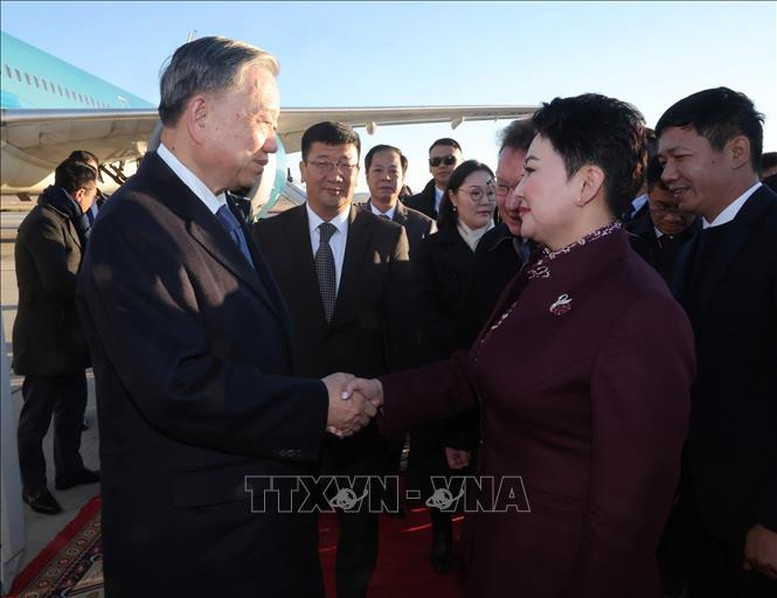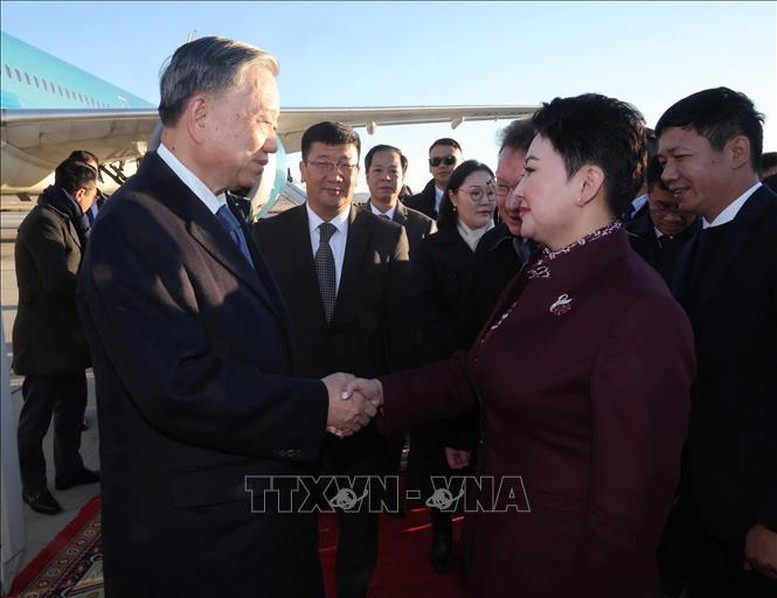FOREIGN RELATION NEWS

This State visit by General Secretary and President To Lam to Mongolia played a crucial role in setting the direction for future cooperation and opened new prospects for the friendly relationship between the two nations.
After successfully concluding the activities of his State visit to Mongolia from September 30 to October 1, on October 1, General Secretary and President To Lam, along with a high-level Vietnamese delegation, departed from Chinggis Khaan International Airport in Ulaanbaatar to begin a State visit to Ireland at the invitation of Irish President Michael D. Higgins.

Party Chief and State President To Lam and senior officials of Mongolia at the airport.
At the airport to bid farewell to the delegation were Foreign Minister B. Battsetseg, Mongolian Ambassador to Vietnam J. Sereejav, Vietnamese Ambassador to Mongolia Nguyen Tuan Thanh, and several staff members of the Vietnamese Embassy in Mongolia.
During his visit, General Secretary and President To Lam held talks with President Ukhnaagiin Khurelsukh, met with Parliament Speaker Dashzegviin Amarbayasgalan and Prime Minister Luvsannamsrain Oyun-Erdene, attended the opening of Vietnam Culture Day 2024 in Mongolia, visited the Hồ Chí Minh School No. 14, and met with the staff of the Vietnamese Embassy and the Vietnamese community in Mongolia. He also met with representatives of several Mongolian businesses.
In all discussions, both sides praised the strong growth of the traditional Vietnam-Mongolia friendship over the past 70 years. They exchanged views on the future development of bilateral relations and on regional and international issues of shared interest.
Mongolia affirmed its view of Vietnam as a key partner in Southeast Asia, expressing a desire to further enhance mutually beneficial cooperation across various fields. Vietnam emphasized its commitment to strengthening relations with Mongolia, appreciating Mongolia's independent, multi-pillar foreign policy and its "third neighbor" policy, while expressing hopes to deepen bilateral ties.
Both sides agreed that enhancing Vietnam-Mongolia relations aligns with the mutual interests of their peoples and contributes to regional and global peace, stability, and development. They agreed to elevate bilateral relations to a Comprehensive Partnership and continue expanding cooperation.
They also agreed to increase exchanges, and high-level contacts through Party, State, Government, and parliamentary channels, and strengthen people-to-people ties. Both countries committed to exploring new cooperation mechanisms between ministries, sectors, and localities, expanding defense, security, and law enforcement cooperation, as well as promoting economic, trade, and investment collaboration. Key areas of focus include agriculture, science, transport, culture, sports, tourism, education, labor, environment, and social protection, alongside enhanced regional and international cooperation.
During the visit, seven cooperation agreements were signed, including a Memorandum of Cooperation between the Ministries of Justice of Vietnam and Mongolia; a cooperation agreement between the Vietnamese Ministry of Public Security and the Mongolian Ministry of Justice and Internal Affairs on cybersecurity and crime prevention; a Memorandum of Cooperation between the Ministries of Transport of Vietnam and Mongolia; a Memorandum of Tourism Cooperation between the Ministries of Culture, Sports, and Tourism of the two countries; a Memorandum on enhancing friendly cooperation between the governments of Hanoi and Ulaanbaatar; a Memorandum of Cooperation between the Vietnam Academy of Science and Technology and the Mongolian Academy of Sciences; and a Memorandum of Cooperation between Vietnam National University and the Mongolian University of Science and Technology.
This State visit by General Secretary and President To Lam to Mongolia played a crucial role in setting the direction for future cooperation and opened new prospects for the friendly relationship between the two nations.
Ngoc Mai